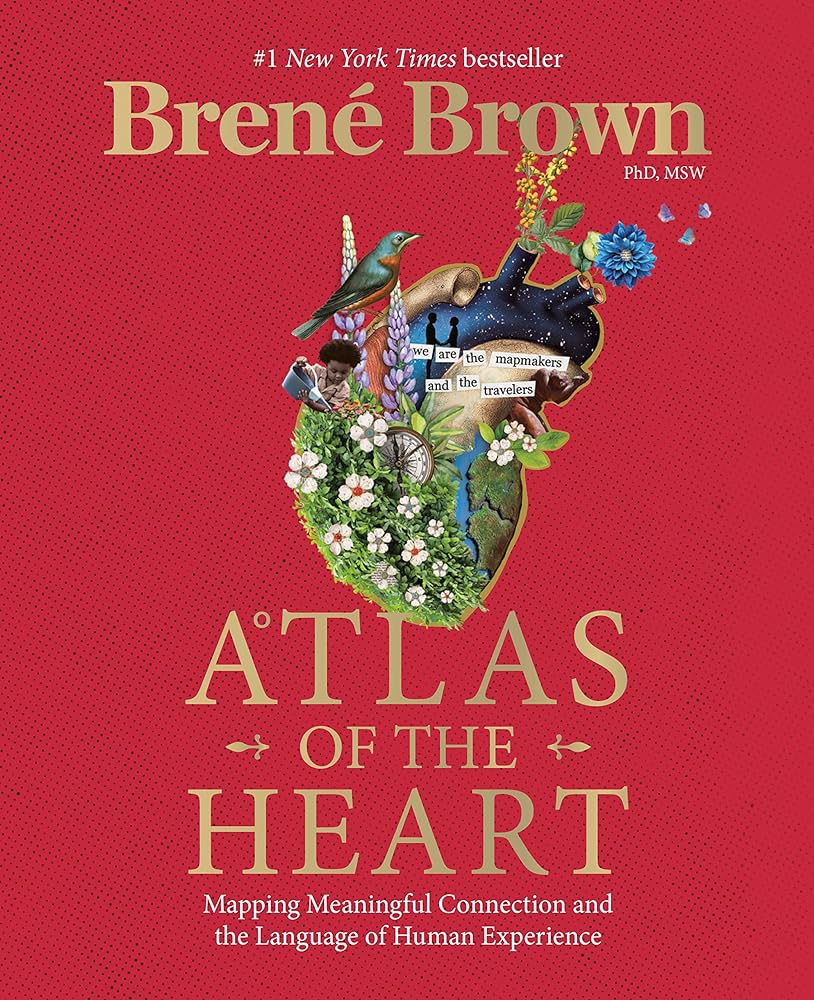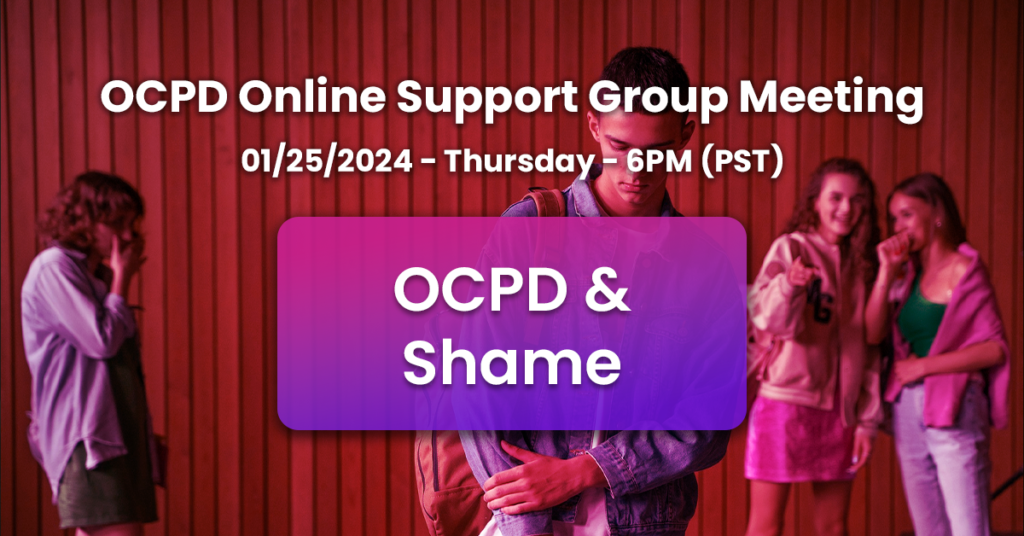Once again, it seems appropriate to share an entire (slightly abridged) section from the book “Atlas of the Heart” on Shame.
For context, the emotion of Shame falls under the heading “Places We Go When We Fall Short” and is grouped with Self-Compassion, Perfectionism, Guilt, Humiliation, and Embarrassment. There’s just too much ground to cover in one post but I will try to include the major highlights since, without hyperbole, I believe Shame to be one of the most fundamental emotions/experiences at the core of the OCPD struggle. Be sure to pick up a copy of the book for the entire breakdown!
Note: If you prefer to take a video approach to learning about Shame then I highly recommend watching Brené Brown’s seminal 2010 TED Talk on The Power of Vulnerability and her follow-up talk on Listening to Shame. I still recall fondly how transformative these two videos were for me when I first viewed them over a decade ago. I’m so grateful that her impact wasn’t just limited to me but began a cultural shift in how we talk about shame, vulnerability, and our emotions more broadly.

Places We Go When We Fall Short
Shame, Self-Compassion, Perfectionism, Guilt, Humiliation, Embarrassment
We’re going to talk about these four terms together because we have the tendency to use them interchangeably, even though the experiences are very different in terms of biology, biography, behavior, backstory, and self-talk. And they lead to radically different outcomes. We’re also going to talk about the important role self-compassion plays in moving through shame and how perfectionism is a function of shame.
Let’s start with some short definitions and examples to differentiate the four emotions, then we’ll dig deeper into each one.
Shame — I am bad. The focus is on self, not behavior. The result is feeling flawed and unworthy of love, belonging, and connection. Shame is not a driver of positive change.
You get back a quiz and your grade is F. Your self-talk is “I’m so stupid.“
Guilt — I did something bad. The focus is on behavior. Guilt is the discomfort we feel when we evaluate what we’ve done or failed to do against our values. It can drive positive change and behavior.
You get back a quiz and your grade is F. Your self-talk is “Going to the party instead of studying for this quiz was so stupid” versus “I’m so stupid.”
Humiliation — I’ve been belittled and put down by someone. This left me feeling unworthy of connection and disgusted with myself. This was unfair and I didn’t deserve this. With shame, we believe that we deserve our sense of unworthiness. With humiliation, we don’t feel we deserve it.
The student sitting next to you sees the F at the top of your quiz and tells the class, “This idiot can’t even pass a quiz in here. He’s as stupid as they come.” Everyone laughs. You feel dumb and enraged.
Embarrassment — I did something that made me uncomfortable, but I know I’m not alone. Everyone does these kinds of things. Embarrassment is fleeting, sometimes funny.
Your teacher is handing out quizzes and you come back from the bathroom with toilet paper stuck to your shoe.
Shame
I hated the internal wounds, the words that said I was worthless and unwanted, the teasing, the ridicule that echoed in my ears and shattered my insides into dust. If given the choice, I’d have picked a beating over being shamed. — ANTWONE QUENTON FISHER, Finding Fish
Here are my shame 1-2-3s:
- We all have it. Shame is universal and one of the most primitive emotions that we experience. The only people who don’t experience it are those who lack the capacity for empathy and human connection.
- We’re all afraid to talk about it. Sometimes we can feel shame when we just say the word “shame.” But it’s getting easier as more people are talking about it.
- The less we talk about it, the more control it has over us. Shame hates being spoken.
When we hear the word “shame,” our first thought is either I have no idea what that means and I don’t want to know, or I know exactly what that is and I don’t want to talk about it. We can also make up that shame is something that happens to other people, not us. But shame is in all of us. Here are some examples shared by the research participants from our early study on shame:
- Shame is hiding the fact that I’m in recovery.
- Shame is raging at my kids.
- Shame is bankruptcy.
- Shame is getting laid off and having to tell my pregnant wife.
- Shame is my boss calling me an idiot in front of the client.
- Shame is not making partner.
- Shame is my husband leaving me for my next-door neighbor.
- Shame is my partner asking me for a divorce and telling me that she wants children, but not with me.
- Shame is my DUI.
- Shame is infertility.
- Shame is telling my fiancé that my dad lives in France when in fact he’s in prison.
- Shame is internet porn.
- Shame is flunking out of school. Twice.
- Shame is hearing my parents fight through the walls and wondering if I’m the only one who feels this afraid.
Connection, along with love and belonging (two expressions of connection), is why we are here, and it is what gives purpose and meaning to our lives. Shame is the fear of disconnection—it’s the fear that something we’ve done or failed to do, an ideal that we’ve not lived up to, or a goal that we’ve not accomplished makes us unworthy of connection. I’m unlovable. I don’t belong.
Here’s the definition of shame that emerged from my research: Shame is the intensely painful feeling or experience of believing that we are flawed and therefore unworthy of love, belonging, and connection.
Shame thrives on secrecy, silence, and judgment. If you put shame into a petri dish and douse it with these three things, it will grow exponentially into every corner and crevice of our lives.
The antidote to shame is empathy. If we reach out and share our shame experience with someone who responds with empathy, shame dissipates. Shame needs you to believe that you’re alone. Empathy is a hostile environment for shame.
Self-compassion also helps us move through shame, but we need empathy as well for an important reason: Shame is a social emotion. Shame happens between people and it heals between people. Even if I feel it alone, shame is the way I see myself through someone else’s eyes. Self-compassion is often the first step to healing shame —we need to be kind to ourselves before we can share our stories with someone else.
According to Kristin Neff, self-compassion has three elements: self-kindness, common humanity, and mindfulness. This is how she defines each of these elements:
Self-kindness vs. self-judgment:
“Self-compassion entails being warm and understanding toward ourselves when we suffer, fail, or feel inadequate, rather than ignoring our pain or flagellating ourselves with self-criticism. Self-compassionate people recognize that being imperfect, failing, and experiencing life difficulties [are] inevitable, so they tend to be gentle with themselves when confronted with painful experiences rather than getting angry when life falls short of set ideals.”
Common humanity vs. isolation:
“Self-compassion involves recognizing that suffering and personal inadequacy is part of the shared human experience—something that we all go through rather than being something that happens to ‘me’ alone.”
Mindfulness vs. over-identification:
“Mindfulness is a non-judgmental, receptive mind state in which one observes thoughts and feelings as they are, without trying to suppress or deny them. We cannot ignore our pain and feel compassion for it at the same time. At the same time, mindfulness requires that we not be ‘over-identified’ with thoughts and feelings, so that we are caught up and swept away by negative reactivity.”
[…] Visit self-compassion.org for additional information from Kristen Neff on self-compassion.
The Four Elements of Shame Resilience
Across our research, the participants who could move through shame without sacrificing their values and authenticity shared four practices when overcoming shame.
We reverse-engineered how they worked through shame to come up with a process that all of us can use. These steps rarely happen in this order—they just all need to happen for us to develop resilience to shame:
Recognizing shame and understanding its triggers:
Can you physically recognize when you’re in the grip of shame, name it, feel your way through it, and figure out what messages and expectations triggered it? This is why Neff’s concept of mindfulness is so important. We can’t pretend it’s not happening or get swept away (which is easy with shame).
Practicing critical awareness:
Can you reality-check the messages and expectations that are driving your shame? Are they realistic? Attainable? Are they what you want to be or what you think others need or want from you?
Reaching out:
Are you owning and sharing your story? We can’t experience empathy if we’re not connecting.
Speaking shame:
Are you talking about how you feel and asking for what you need when you feel shame? Silence, secrecy, and judgment fuel shame.
Shame in Culture
One reason we get so confused about the term “shame” and what it means is that we misuse it all the time. People throw around the word “shameless” when they see someone make a self-serving or unethical decision—they attribute unconscionable behavior to a lack of shame. This is wrong and dangerous. […]
Shame is not a compass for moral behavior. It’s much more likely to drive destructive, hurtful, immoral, and self-aggrandizing behavior than it is to heal it.
Why? Because where shame exists, empathy is almost always absent. That’s what makes shame dangerous. The opposite of experiencing shame is experiencing empathy. The behavior that many of us find so egregious today is more about people being empathyless, not shameless.
Ronda Dearing’s […] summary of how empathy and shame work together (or, actually, do not work together) is incredibly helpful:
Empathy is an other-focused emotion. It draws our attention outward, toward the other person’s experience. When we are truly practicing empathy, our attention is fully focused on the other person and trying to understand their experience. We only have thoughts of self in order to draw on how our experience can help us understand what the other person is going through.
Shame is an egocentric, self-involved emotion. It draws our focus inward. Our only concern with others when we are feeling shame is to wonder how others are judging us. Shame and empathy are incompatible. When feeling shame, our inward focus overrides our ability to think about another person’s experience. We become unable to offer empathy. We are incapable of processing information about the other person, unless that information specifically pertains to their view of us.
Perfectionism
Shame is the birthplace of perfectionism. […] (This section is too large to include as well even though it’s incredibly relevant.)
Other Resources
https://www.chrismackey.com.au/addressing-guilt-and-shame-with-self-compassion/

![[Zoom Meeting] OCPD & Disgust 🤢](https://www.youmeandocpd.com/wp-content/uploads/2023/12/2023-12-14-OCPD-Disgust-1024x536.jpg)
![[Zoom Meeting] Reflecting on the Year 2023 📝🔍](https://www.youmeandocpd.com/wp-content/uploads/2023/12/2023-12-28-OCPD-Reflecting-on-the-Year-1024x536.jpg)